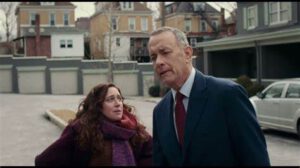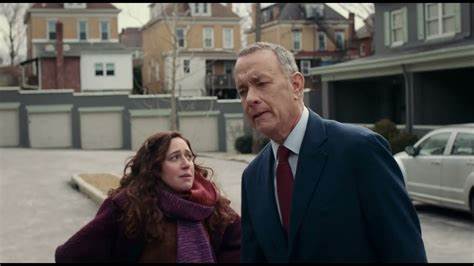Movie Info
Movie Info
- Director
- Marc Forster
- Run Time
- 2 hours and 6 minutes
- Rating
- PG-13
VP Content Ratings
- Violence
- 1/10
- Language
- 2/10
- Sex & Nudity
- 1/10
- Star Rating
Relevant Quotes
A cheerful heart is a good medicine, but a downcast spirit dries up the bones.
He has told you, O mortal, what is good, and what does the Lord require of you but to do justice and to love kindness and to walk humbly with your God?
Whoever pursues righteousness and kindness will find life and honor.

If, like me, you have seen the Swedish original A Man Called Ove, then Tom Hanks is probably the reason for attending this American remake. The original 2015 feel-good story of a Grinch-like old man locked into his bubble of mourning for his dead wife would have been a hit in America if movie goers were more tolerant of subtitled movies. Another reason for not ignoring this remake is that Marc Forster directed a film I love, Monster’s Ball. So, this fact, added to Tom Hanks, made me hopeful that the remake would be better than the mediocre one of Wim Wender’s masterpiece, Wings of Desire. And this was before Mariana Treviño’s portrayal of one of Hank’s new neighbors appeared, almost lighting up the screen with her incandescent portrayal of a Mexican immigrant.
In the remake Otto lives in a gated enclave in an unnamed city, where he is eased out of his engineering job by his superiors and staff. He harasses residents and delivery persons with equal ferocity over parking their vehicles in the marked spaces or for forgetting to close the gate after they enter. He monitors the trash receptacles, grudgingly removing plastic bottles or metal cans that have been discarded in the wrong bins. At the hardware store he holds up the line because he is charged an extra 33 cents for a length of rope—he had measured out a length short of the full yardage because he did not need so much, but the computer is set to charge by the yard and not by the foot. A frustrated customer behind him offers to pay the difference, but he tells him to mind his own business.
When Otto takes flowers to the grave of his beloved Sonya (Rachel Keller in flashbacks) he tells her he will soon join her. He intends to keep his promise as he ties the rope he has bought to a ceiling hook which once held the chandelier and fashions a noose around his neck. However, he has left the curtains open, and he sees a car and a trailer pull up outside and the driver making a mess of his attempts to backup and park. This is the kind of incompetence that Otto cannot stand, so he climbs down from the chair and rushes outside, demanding that the man get out. With no hesitation Otto smoothly parks the car and trailer, brushing aside the newcomers thanks.
However, later when Marisol, wife of the incompetent parker Tommy (Manuel Garcia-Rulfo), shows up at his doorstep with a dish she has cooked as a way of saying thanks, he is forced to accept it despite his initial reluctance. It proves to be so tasty that he decides to put off for a day his plan to join his wife. He continues his rounds of grumpily policing the neighborhood, ignoring the friendly gestures from the neighbor obsessed with physical exercising, yelling at the dog walking lady, and lecturing the United Parcel lady who persistently parks her truck in any vacant spot available. Carried over from the original is a stray cat that is scorned by Otto, but which we know is destined to taking up residence in his home.
Marisol and her husband increasingly encroach on his life, as do their two sweet daughters Luna and Abbie. Marisol especially is intrusive to his efforts at self-instruction, such as when he has carefully fixed a hose to the exhaust pipe of his car and closes the garage door. One of my favorite scenes in the film is the one in which he is upset that as an adult she does not know how to drive, so he offers to teach her. He insists that they use his stick transmission car because only then will she really know how to drive. Of course, she has a terrible time engaging the clutch. Almost rear-ending the car ahead of her, and with the car lurching at times, she is about to give up, when the grump’s better nature emerges. He reminds her of all that she has already accomplished—she has come to a new country, learned its ways, married, and delivered two babies, so she can certainly learn this skill. It is exactly what the underconfident woman needs to hear, making this scene rank with the other great driving lesson scene, that in the great film Grand Canyon when Kevin Kline’s character teaches his son how to drive, one of my favorite “moments of grace” in film.
Through flashbacks (I love it that the younger Otto is played by Truman Hanks, Tom’s son!) we see what a fine marriage Otto had enjoyed following his cute meeting up with Sonya, and how her premature injury causing her to miscarry their baby and subsquent death had sent him into such deep despair that he lost his will to live, especially after he was forced to retire, thus losing his last reason for going on living. He slowly regains his reasons for living not only through Marisol and her family, but also from Malcolm, the paper boy whose favorite school teacher had been Sonya. Otto not only fixes the boys broken bicycle, but takes him during the night that the boy’s father kicks him out upon learning that he is gay. From homeless cat to rejected boy! And there’s more, concerning a Black couple, Reuben and Anita, from whom Otto had become estranged because the men argued over car brands. After not talking for years, Otto comes to their aid by devising a plan to thwart a greedy realtor’s attempt to oust the couple so he can take over their house.
Otto’s story is of a depressed man, bitter at the world, and because his pain leads him to center all of his attention on himself, had become blind to all the goodness of those about him, such as the exercising neighbor who ignored his caustic insults and continued to greet him cheerfully. Most of all, of course, it is the concern and kindness of Marisol and her family who overcome his defenses, melting his frozen heart, and returning him to his humanity. We would do well to consider this film a visual parable of kindness and its healing effect upon the wounded psyche. It’s conclusion might be called bittersweet, but it is one that satisfies both heart and mind.
This review will be in the February issue of VP along with a set of questions for reflection and/or discussion. If you have found reviews on this site helpful, please consider purchasing a subscription or individual issue in The Store.

